the place where Paleontology and Paleoanthropology meets Philately
Latvia
Fossil and reconstruction of prehistoric fish on stamps and postmarks of Latvia
| << previous country | back to index | next country >> |
Contents:
- Country overview
- Philately of Latvia
- Official stamps of Latvia related to Paleontology
- Other stamps of Latvia to consider
- Commemorative postmarks of Latvia related to Paleontology
- References
- Acknowledgements
Latvia, officially the Republic of Latvia, is a country in the Baltic region of Northern Europe, one of the three Baltic states. It is bordered by Estonia to the north, Lithuania to the south, Russia to the east, and Belarus to the southeast, as well as a maritime border to the west alongside Sweden.
Latvia has slightly more than 2 million inhabitants and a territory of 64,589 km2.
Latvia is a democratic parliamentary republic established in 1918. The capital city is Riga, the European Capital of Culture 2014. Latvian is the official language. Latvia is a unitary state, divided into 118 administrative divisions, of which 109 are municipalities and 9 are cities.
The Republic of Latvia was founded on 18 November 1918. However, its de facto independence was interrupted at the onset of World War II. In 1940, the country was forcibly incorporated into the Soviet Union, invaded and occupied by Nazi Germany in 1941, and re-occupied by the Soviets in 1944 to form the Latvian SSR for the next fifty years.
The peaceful Singing Revolution, starting in 1987, called for Baltic emancipation of Soviet rule. It ended with the Declaration on the Restoration of Independence of the Republic of Latvia on 4 May 1990, and restoring de facto independence on 21 August 1991. [R1]
The first stamps of modern Latvia were issued on October 19, 1991 with face value in Kopejka (still in Soviet currency). The first stamps with new, Latvian currency: Lat were introduced on October 3, 1992. The Latvian lats currency used in the country until it was replaced by the Euro on 1 January 2014. [R2]
Official stamps of Latvia related to Paleontology: fossils and reconstruction of prehistoric animals
| 20.02.2015 "Latvian Museum of Natural History: Placodermi - Devonian fish" | ||
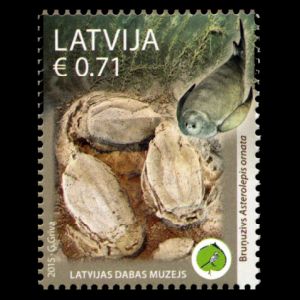 |
|
|
Other stamps of Latvia to consider: Amber
| 14.02.2020 "Unique Exhibits of the Latvian Museum of Natural History-Amber" [A1] | ||
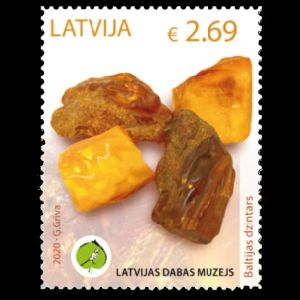 |
|
|
Notes:
[A1] Amber is fossilized tree resin, which has been appreciated for its color and natural beauty since Neolithic times, sometimes it also include some prehistoric insects inside, as shown on stamps of Poland 1993 and Lithuania 2009 for example.
Commemorative postmarks of Latvia related to Paleontology: prehistoric fish, paleontologist
Legend is here| 20.02.2015 "Latvian Museum of Natural History: Placodermi - Devonian fish" [FDC] | xx.07.1995 "200th anniversary of Karl Eduard von Eichwald " [C1] [Sp] | |
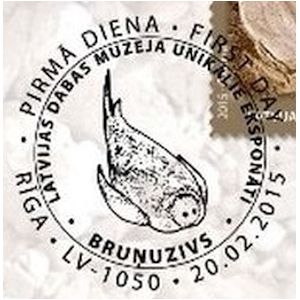 |
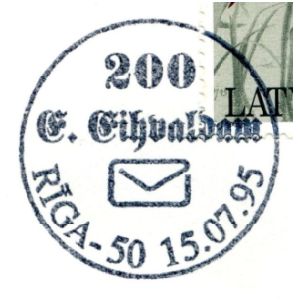 |
|
Notes:
[C1] Karl Eduard von Eichwald (1795-1876) was a Baltic German geologist, physician, and naturalist, who worked in Russia.
He became doctor of medicine and professor of zoology in Kazan in 1823; four years later professor of zoology and comparative anatomy at Vilnius; in 1838 professor of zoology, mineralogy and medicine at St. Petersburg; and finally professor of palaeontology in the institute of mines in that city. [R3]
Commemorative covers of Latvia related to Paleontology: paleontologists
| xx.07.1995 "200 anniversary of Karl Eduard von Eichwald " [C1] | ||
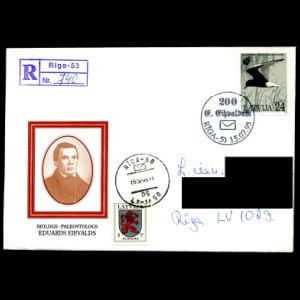 |
|
|
References:
- [R1] Latvia: Wikipedia, WikiTravel, FlagCounter.
- [R2] Postal History and Philately of Latvia:
Wikipedia,
Links to official website of the Post Authority, stamp catalog and a list of new stamps of Latvia are here. - [R3] Karl_Eichwald: Wikipedia
Acknowledgements:
Many thanks to Dr. Peter Voice from Department of Geological and Environmental Sciences, Western Michigan University, for reviewing the draft page and his very valuable comments.
| << previous country | back to index | next country >> |